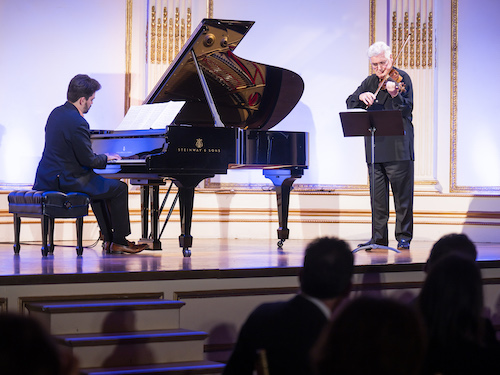Your Daily Phil: Multidisciplinary Jewish text in Berlin + A response on Hebrew at camp
Good Thursday morning!
In today’s Your Daily Phil, we report on a Jewish initiative based in Germany that combines Jewish text and art, and feature an op-ed by Ramah Nyack’s Rabbi Ami Hersh responding to an earlier piece on Hebrew at summer camp. Also in this newsletter: Noa Tishby, Faith Leener, Erica Aren and Tamar Frydman. We’ll start with an exclusive on research tracking fossil fuel investments among Jewish organizations.
Two months ago, a broad coalition of Jewish organizations collectively committed to reducing their emissions and taking action to combat climate change. But a new report by Dayenu, a Jewish climate activism group, shows that some of those same Jewish organizations have investments tied up in fossil fuels.
The report, which was published today, found that the leading Jewish federations, foundations and denominational organizations have a median of 5.54% of their investments placed in oil, gas and coal companies — close to the rate of fossil fuel investment across the market.
The organization argues that those groups can’t effectively keep their promises to combat climate change if they are also funding polluting organizations, and that even if oil and gas companies are posting robust profits now, they’re turning into increasingly risky bets for Jewish groups with long-term investment strategies.
“A key piece of keeping fossil fuels in the ground and unburned is to stop the money that is keeping the industry afloat,” Rabbi Jennie Rosenn, the CEO of Dayenu, told eJewishPhilanthropy. “Renewable energy is on the up, fossil fuels are on the down, but they’re being kept afloat by capital.”
Dayenu opted against singling out the investments of individual Jewish organizations, or explicitly listing which groups it surveyed. Instead, the organizations surveyed are categorized into three sets: the various bodies of the four major American Jewish denominations; the twenty largest federations by population size; and the twenty largest private foundations whose giving is based on Jewish values. The calculations are based on public tax documents or public financial statements.
Together, according to the study, the groups surveyed hold investments totaling some $34 billion. The report gives the total sum invested in fossil fuels in each of those three categories, and the median investment of the organizations surveyed, which hovers around 5.5% in all of the categories.
Read the full story here.
opening the gate


In one of Elliot Safra’s most distinctive Hanukkah memories, he was standing with others in “this enormous space” in a contemporary art museum in London, when the lights shut off and everyone began a breathing exercise while walking. It was a program put on by Shiur, a nonprofit that gives people opportunities to engage with Jewish text and practice in multidisciplinary and often unexpected ways, reports Daniela Cohen for eJewishPhilanthropy.
Multiple meanings: Founded by filmmaker and artist Micki Weinberg in Berlin in 2018, Shiur means “lesson” or occasionally “measurement” in Hebrew and is related to the Hebrew word sha’ar, or “gate,” Shiur’s multiple meanings convey the initiative’s purpose of re-examining the world through different mediums.
Flexible budget: The organization breaks paradigms in another respect as well. It doesn’t have an operating budget — instead planning events and funding them on an ad-hoc basis. Nor does it have a paid staff, though Weinberg is hoping to hire one soon and to have an annual budget. The organization has received funding from the German Ministry of Interior, the American Jewish Joint Distribution Committee, the Jewish Agency for Israel and other donors.
Multidisciplinary: Participants engage in text-based discourse around a “multiplicity of content in art, literature, philosophy, cinema and more,” Weinberg told eJP. For example, a November 2021 program called “The Ballad of High Noon” featured Yazidi artist and activist Sedat Oezgen. Together, participants discussed the texts sent out in the newsletter, which included the work of scholar Gershom Scholem, an essay by Marxist activist Rosa Luxemburg, and a graphic novel by Will Eisner. Participants were invited to try drawing three very different sketches of a person in their lives and re-interpret them, an activity that reflected playwright Bertolt Brecht’s idea of challenging the concept of a “legitimate sketch.”
language lesson
Davar acher (another opinion): Hebrew literacy at Jewish summer camp


“As we celebrate 10 years of the Sha’ar program at Ramah Nyack, we want to add our voice to the conversation that Hunter Boyer started earlier this week in eJewishPhilanthropy. Hebrew education presents in diverse ways across the field of Jewish camp, and we are excited to share what we have developed and learned at Ramah Nyack and at the other Ramah day camps. As an educator, there is nothing in my career that I have done that brings more pride than the development and growth of Sha’ar,” Rabbi Ami Hersh writes in an opinion piece for eJP.
Full immersion: “At the most basic level, Sha’ar is a summer day camp program conducted in an immersive Hebrew environment. Counselors, mostly Israeli, commit to speaking entirely in Hebrew to their campers — no English — though campers can always express themselves in any language they choose. Campers play, swim, dance, transition between activities and even eat in a Hebrew environment.”
Like riding a bike: “We have consistently noted that we begin to hear language production from most campers during the third week of camp. Language production continues to grow throughout the summer. These results are lasting. We have consistently seen that within the first two weeks of the summer, returning campers — regardless of Hebrew usage during the year — are back to the same level of Hebrew proficiency that they had obtained at the end of the previous summer.”
Worthy Reads
The Motivation-Hygiene Method: Higher salaries and salary transparency are great, but can’t make office workers happy, Leading Edge’s Amy Born and Gali Cooks write in the Stanford Social Innovation Review, invoking psychologist Frederick Herzberg’s “motivation-hygiene theory” which divides workplace experiences into two groups: “‘Hygiene factors’ can’t make you happy, but they can make you miserable. Think of your knees. When your knees are in good health, you don’t walk around thinking, “Wow, my knees are feeling phenomenal today! That makes me so happy!” In fact, when your knees have no problems, you don’t even notice them. But go sprain your knee, and, well … in the worst way, you notice! The other group is ‘motivational factors.’ These won’t, in their absence, make you miserable, although the lack of them might leave you feeling sort of blah. But when they’re there, they can light you up, in the best way… [Salaries] are hygiene factors. Other hygiene factors include workplace policies and procedures, a safe and pleasant physical work environment, social status, and reliability of employment. And of course, these things matter; people will be dissatisfied if you don’t get them right and they will be much more likely to leave. But hygiene factors are floors for creating a great place to work, not ceilings.” [SSIR]
Philanthropy Over the Years: A recent report from the Dorothy A. Johnson Center for Philanthropy at Grand Valley State University looks at philanthropy over the past three decades and indicates that the path for philanthropy might be better than it seems, Leslie Lenkowsky writes in The Chronicle of Philanthropy: “The report — Philanthropy: 1992-2022: What Difference Can 30 Years Make?’ — points out that giving has kept pace with the nation’s economic growth, rising from $124.31 billion in 1993 to $484.85 billion in 2022… Despite Internal Revenue Service efforts to cull those groups that are no longer operating, the number of registered public charities doubled to almost 1.3 million by 2020, while the number of private foundations grew by 68 percent, reaching nearly 100,000. Many more nonprofits, typically religious and community groups, operate without registering with the IRS. The past three decades have also seen the growth of a variety of organizations providing services to philanthropy, including this publication, which launched in 1988. Hundreds of colleges and universities started programs to prepare students for careers in nonprofits and increase public understanding of the field. That may partly explain why more attention has been given to measuring and evaluating the results of philanthropic efforts.” [ChronicleofPhilanthropy]
Around the Web
The Jewish Future Pledge now has 11,000 signatories — the most recent being Israeli actor, producer and author Noa Tishby. The pledge mandates that signatories donate at least half of the money they give upon their deaths to Jewish or Israeli causes…
Faith Leener, a co-founder of the Base network of pluralist Jewish centers for young adults, has been named the chief innovation officer of the Jerusalem-based Pardes Institute of Jewish Studies, effective March 1, 2023. In the role, she will direct Pardes North America…
Erica Aren joined the Jewish Community Center of San Francisco as senior director of roots and culture. She was previously a senior administrator at Golden Bridges School…
Tamar Frydman joined the Orthodox Union as director of the OU Impact Accelerator. She was previously senior director of programs at the Jewish Funders Network…
The Culver City Unified School District in Culver City, Calif., introduced and supported a resolution affirming the value of Jewish students, staff and families, according to the Jewish Federation of Greater Los Angeles, and will work with the federation to enhance its training and education related to Judaism, Israel and antisemitism…
UNESCO launched a training program for teachers, superintendents and principals in schools across the United States to address antisemitism and distortion and denial of the Holocaust. The program was launched in partnership with the University of Southern California’s Shoah Foundation, the American Federation of Teachers and the American Jewish Committee…
Pic of the Day


Lahav Shani (left) and Pinchas Zukerman perform last week at the gala of the American Friends of the Israel Philharmonic Orchestra at the Plaza Hotel in New York City.
Birthdays


Musician and actress, her film “Licorice Pizza” was released last December, Alana Mychal Haim…
Former member of the New York State Assembly, attorney general of New York and member of the New York City Council, Oliver Koppell… Senior rabbi emeritus at Congregation Mt. Sinai in Brooklyn Heights, now EVP of the New York Board of Rabbis, Rabbi Joseph Potasnik… Actress and voice artist, best known for her role in the 1990s Fox sitcom “Parker Lewis Can’t Lose,” Melanie Chartoff… Russian oligarch and owner of the largest construction company for gas pipelines in Russia, Arkady Rotenberg… Associate lecturer in religious studies at the University of Wyoming, Seth Ward… President and CEO of the Jewish Federation of Greater Kansas City, Dr. Helene Lotman… Chairman and founder of BizBash, David Adler… Sportscaster, best known as the radio voice for the Alabama Crimson Tide football team, Eli Gold… U.S. Sen. Mark Warner (D-VA)… Executive chairman of South Africa’s Resolve Communications, Tony Leon… Executive director at Silicon Couloir in Wyoming, Gary S. Trauner… Actress, singer and songwriter, she appeared in the title role of the 1984 film “Supergirl,” Helen Slater… Television and movie producer, producer of the first eight seasons of the “Pokémon” TV series and writer of most of the “Pokémon” films, Norman J. Grossfeld… Rabbi serving communities in California’s Central Valley, Paul Gordon… Chicago-born stand-up comedian and author, Joel Chasnoff… Director of community relations and Israel affairs at the Jewish Federation of Greater Charlotte, Tal Selinger Stein… Actor, writer and musician, he is known for his role as Seth Cohen on “The O.C.,” Adam Brody… Recent mayor of Bal Harbour, Fla., Gabriel Groisman… D.C.-based chef and restaurateur, Spike Mendelsohn… Israeli singer-songwriter and actress, she played the role of Hila Bashan on Season 3 of “Fauda,” Marina Maximilian Blumin… Client solutions manager at Samsung Ads, Julie Winkelman Lazar… Principal at Activate Consulting, Lily Silva… and her twin brother, a graduate student at Georgetown University’s Walsh School of Foreign Service, Nicholas Silva… Figure skater who represented the U.S. at the 2014 and 2022 Winter Olympics, Jason Brown… Journalist and adjunct fellow at The Washington Institute for Near East Policy, Neri Zilber…








